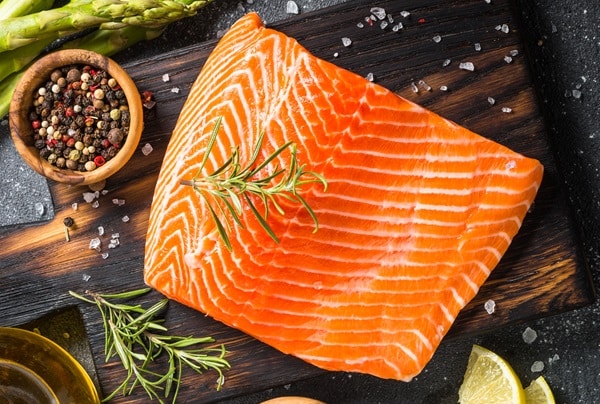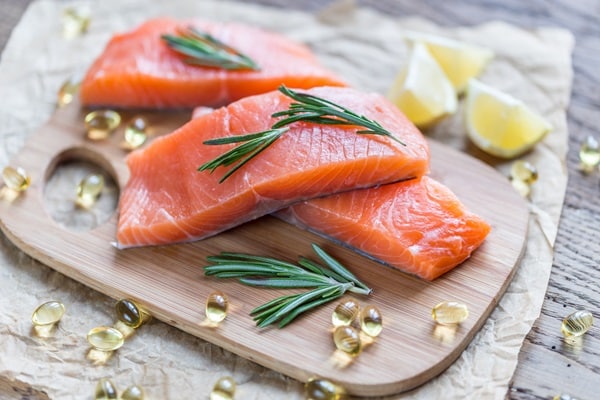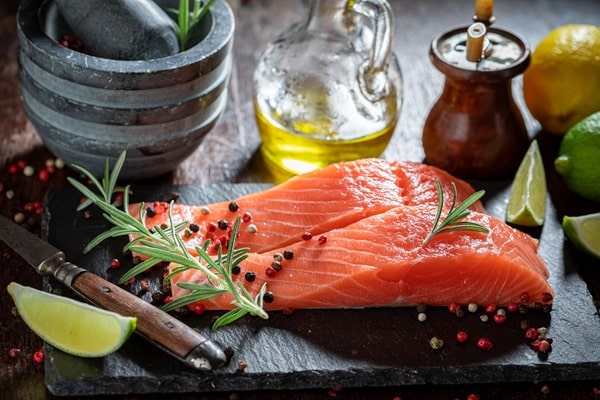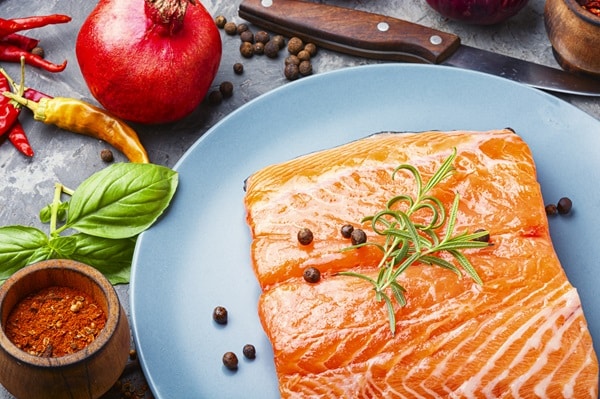Salmon, a widely celebrated fish known for its rich flavor and myriad health benefits, stands out in the culinary world. Packed with a unique blend of nutrients, it’s not just a staple for its taste but also for its contribution to health, particularly the immune system. This post delves into how the vitamins, minerals, and particularly omega-3 fatty acids found in salmon play a pivotal role in maintaining and enhancing immune function. As you explore the influence of this nutritious fish on your body’s defense mechanisms, the aim is to shed light on how regular consumption of salmon might be beneficial in bolstering your health.
Contents
- 1 Nutritional Profile of Salmon
- 2 Omega-3s: Inflammation and Immunity
- 3 Vitamin D’s Role in Immunity
- 4 The Antioxidant Power of Selenium
- 5 Protein and Amino Acids
- 6 Gut Health and Immune Function
- 7 Balancing Your Diet With Salmon
- 8 Potential Risks and Considerations
- 9 Discover the Immune-Boosting Power of Salmon
Nutritional Profile of Salmon

Salmon is a treasure trove of essential nutrients, including a spectrum of B vitamins, vitamin D, selenium, and significant amounts of Omega-3 fatty acids. These nutrients are crucial for maintaining optimal health and play a pivotal role in immune function. Notably, vitamin D is known for its immune-modulating effects and its ability to enhance the pathogen-fighting effects of monocytes and macrophages, vital components of the immune response. The presence of selenium in salmon acts as a powerful antioxidant, helping to reduce oxidative stress and enhance overall immunity. This rich nutritional profile makes salmon an excellent food choice for those looking to support their immune system.
The omega-3 fatty acids, EPA and DHA, found abundantly in salmon, are renowned for their anti-inflammatory properties. They are involved in the formation of compounds called resolvins and protectins, which help resolve inflammation and repair damaged tissues. By modulating the inflammatory responses, omega-3 fatty acids can help maintain a healthy immune system balance, reducing the risk of chronic diseases associated with overactive immune responses. Regular consumption of salmon can ensure an adequate intake of these essential fats, supporting the body’s defense mechanisms.
Omega-3s: Inflammation and Immunity

Inflammation is a natural response of the immune system to harmful stimuli, but when it becomes chronic, it can lead to various health issues. Chronic inflammation is linked to numerous diseases, including heart disease, diabetes, and arthritis, and can negatively impact immune function. Omega-3 fatty acids in salmon are known for their ability to reduce the production of molecules and substances linked to inflammation, such as inflammatory eicosanoids and cytokines. Through these mechanisms, omega-3s can help reduce the risk of chronic inflammation and maintain a healthy immune system.
The specific role of omega-3s in immune function extends beyond just reducing inflammation. These fatty acids are integral to the structure of cell membranes and are involved in the function of immune cells. Omega-3s enhance the activity of white blood cells, known as B cells, which are responsible for producing antibodies. Furthermore, they can influence the function of other immune cells, such as T cells and macrophages, ensuring a more effective immune response. By incorporating salmon into the diet, individuals can provide their bodies with these essential nutrients, promoting a more robust and responsive immune system.
Vitamin D’s Role in Immunity

Vitamin D is a fat-soluble vitamin that is crucial for immune system health, and salmon is an excellent source of this nutrient. It enhances the pathogen-fighting effects of monocytes and macrophages — defensive cells that are essential components of the immune response — and decreases inflammation, helping to promote immune response. Adequate levels of vitamin D are associated with a lower risk of respiratory infections and conditions such as flu. Therefore, consuming vitamin D-rich salmon can be a key factor in maintaining healthy immune function and protecting against various illnesses.
Research has consistently shown the positive impact of vitamin D on the immune system. Studies indicate that individuals with adequate vitamin D levels have a lower incidence of autoimmune diseases and are less susceptible to infection. Vitamin D receptors on immune cells suggest a significant role for vitamin D in the immune response, and its deficiency is linked with increased susceptibility to infection. Including salmon in the diet as a rich source of vitamin D can thus play a critical role in enhancing immune health and resilience against diseases.
The Antioxidant Power of Selenium

Selenium is a crucial mineral found in salmon, known for its antioxidant properties and role in boosting immune function. It is vital for the health of immune cells, particularly for the production of glutathione peroxidase, an enzyme that helps protect the body from oxidative damage. Adequate selenium intake is essential for initiating immunity and helping to reduce oxidative stress, which can damage cells and lead to chronic diseases. The selenium in salmon assists in the regeneration of antioxidants in the body, enhancing the overall immune defense system.
Furthermore, selenium’s influence extends to regulating immune responses. It plays a role in the prevention of overactive immune responses and autoimmune conditions. By controlling the production of reactive oxygen species and helping to regulate the immune response, selenium ensures that the immune system functions effectively without causing undue harm to the body. Regular consumption of selenium-rich salmon can contribute to a balanced and effective immune response, providing a strong defense against pathogens and diseases.
Protein and Amino Acids

Proteins are the building blocks of life, essential for the growth and repair of all cells, including those of the immune system. Salmon is an excellent source of high-quality protein and contains a variety of amino acids, which are vital for the production and action of immune cells such as lymphocytes and antibodies. Amino acids from protein in salmon help in the formation of these cells and ensure they function correctly, providing a robust defense against pathogens.
Furthermore, the specific amino acids in salmon, such as arginine and glutamine, have particular importance in immune health. Arginine is known to play a role in wound healing and helps in the functioning of T-cells, types of lymphocytes that are central to the immune response. Glutamine is another amino acid that serves as fuel for immune cells, promoting their activity and proliferation. Including salmon in one’s diet ensures an adequate supply of these essential amino acids, supporting the body’s ability to fend off infections and diseases.
Gut Health and Immune Function

The gut is a significant site of immune activity in the body, and its health is intrinsically linked to the overall immune system. Beneficial gut bacteria play a significant role in developing and maintaining the immune response. Salmon, with its high content of omega-3 fatty acids and vitamin D, can support the health of the gut lining and promote the growth of good bacteria, thereby enhancing gut health and, consequently, immune function.
Omega-3 fatty acids from salmon are known to reduce inflammation in the gut, helping to maintain a healthy intestinal lining and prevent disorders like inflammatory bowel disease. Vitamin D also contributes to gut health by regulating immune responses and maintaining the integrity of the gut barrier. A healthy gut barrier prevents harmful pathogens from entering the bloodstream and triggering immune responses, thereby maintaining immune system balance and preventing chronic inflammation.
Balancing Your Diet With Salmon

Incorporating salmon into the diet can significantly contribute to balanced nutrition and immune health. Salmon’s versatility in cooking and its availability in various forms, such as fresh, frozen, or canned, make it a convenient addition to meals. Whether grilled, baked, or added to salads and pastas, salmon can be a delicious way to enhance dietary variety. It’s important to consider preparation methods to retain the maximum nutritional benefit, favoring baking or grilling over frying.
When considering dietary balance, it’s also crucial to pair salmon with a variety of other foods that support immune health, including vegetables, fruits, whole grains, and nuts. A diet diverse in nutrients ensures that the body receives a broad spectrum of vitamins, minerals, and antioxidants needed for a robust immune response. Incorporating salmon as a regular part of a varied diet can thus be a strategic choice for those looking to improve their immune health through nutrition.
Potential Risks and Considerations

While salmon is undoubtedly beneficial for health, it’s also important to be aware of potential risks and considerations. One concern is the presence of mercury and other environmental contaminants in some fish. To minimize these risks, consumers should seek out salmon from reputable sources, opt for wild-caught or sustainably farmed options, and vary their fish intake among different species to reduce exposure to contaminants.
Additionally, sustainability and ethical considerations are increasingly important. Overfishing and unsustainable farming practices can harm marine ecosystems and the quality of the fish. Consumers can look for certifications indicating sustainable practices and make informed choices to support the environment and ensure the continued availability of this nutritious resource. By being mindful of these considerations, individuals can enjoy the health benefits of salmon while also contributing to the health of the planet.
Discover the Immune-Boosting Power of Salmon
Embracing salmon as a regular part of your diet can significantly enhance immune function due to its rich array of omega-3 fatty acids, proteins, vitamins, and minerals. By making informed choices about sourcing and incorporating this nutritious fish into a balanced diet, you not only support your health but also contribute to environmental sustainability. Take the leap towards a healthier immune system and a more vibrant lifestyle by making salmon a staple in your nutritious journey.


